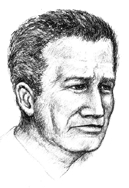The Next Faithful Step
Episode 4: Vic Vargo Dies
Almond Springs (Scott Cormode, Fuller Seminary)
In early October, Rev. Charlotte Robinson was continuing her new tradition of Saturday breakfast with Laura Webber at Vargo's, a diner that Vic Vargo owned. There was suddenly a frantic commotion in the back of the restaurant. A minute later the waitress leaned over their table and whispered, "Vic's had another heart attack. Louis Walsh just called from the hospital. Vance is headed there now." Then she cocked her head at Charlotte and said sadly, "I think he might need a priest." With that, Charlotte headed for the hospital.

Vic Vargo
Within minutes, a tense crowd had gathered in the waiting room. In one corner, Dr. Davis conferred with Louis Walsh as Vic's son, Vance, looked on. Over by the fish tanks, a knot of church members huddled. Vic's daughter-in-law, Camille, comforted Lazarus and Dorcas Pha, the Cambodian couple who ran the dry cleaner Vic owned (it was called "The Pressed Oh!"). Dorcas was clearly praying.
Charlotte thought she understood the tension in the room. Vic had been a generous but unpredictable businessman. The Phas feared not only for Vic's life but for their own livelihoods as well. Charlotte was surprised to see Stuart Dolman, the church treasurer, there. She had not known that they had been close. When she asked him about it, the treasurer said with a sardonic smile, "Don't think of 'pillar of the church' as a metaphor."

Vance Vargo

Camille Vargo
By Vic's bedside, a few hours later, Charlotte held Vic's hand and prayed. When Vance and Camille came in, she started to slip away so they could have a moment. But Vic clung to her hand as he strained to speak. "Don't worry,Vance," he said, "you will be OK. You stick to the diner and let Cami handle the businesses. There's even something in the housing development for you." Vance nodded without really understanding. The two made their tearful peace, and then Cami led her dazed husband away. Vic still would not let go of Charlotte's hand. "Vivian," he said calling her by his long-dead wife's name, "I've left what I could for him. Don't go just yet." Then Vic drifted off, his grip just as firm.
He awoke a little later. "Thank you for staying with me, pastor," Vic said, "I have something to I need you to hear." Charlotte shifted in her chair. "When Louis and I started working on getting the new highway," he said with pleading eyes, "we did it for all the right reasons. He wanted to help the town and I wanted to do right by Vivian, who crashed her car on the old road. But then we discovered how lucrative it could be.
"My hardware store props up all my other businesses. Vance keeps losing money at the diner. And there just aren't enough people in town to support the cleaners. The Phas feel so guilty about that. But it's not their fault. So I kind of spread the wealth from the hardware store, if you know what I mean." But Charlotte did not know. Vic faded for a while. Then he asked for the nurse. While she was coming, Vic turned to Charlotte and said, "My business needs a conscience. You'll see." Then the nurse asked Charlotte to wait outside.
Vic Vargo died a few minutes later. Charlotte spent most of the day with church members who were affected by Vic's passing. Vance was silent, stupefied and alone. Louis Walsh was frenetic but distracted, needing to be a hero but unable to focus. Lazarus Pha felt alternating bouts of grief and fear, wanting to celebrate Vic's generosity but constantly wondering what would become of their business. Dorcas, on the other hand, spoke reverantly of Vic as God's blessing, the one who transformed their Cambodian nightmare into the American dream. Each person had a different experience of Vic's life and death.
Exhausted, Charlotte returned home on Saturday night wondering if Vic's death should be the focus of her sermon the next day. Could the wait until the Tuesday funeral to hear a spiritual interpretation of this intensely communal event? Vic was a leader in the town and in the congregation. Charlotte wanted to write at three levels, acknowledging the combination of personal grief, congregational loss, and civic abandonment that her congregants felt.
